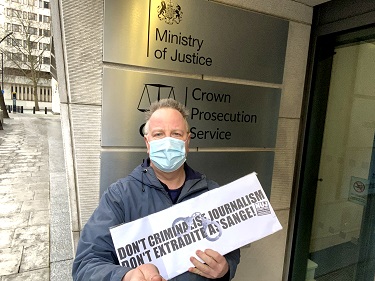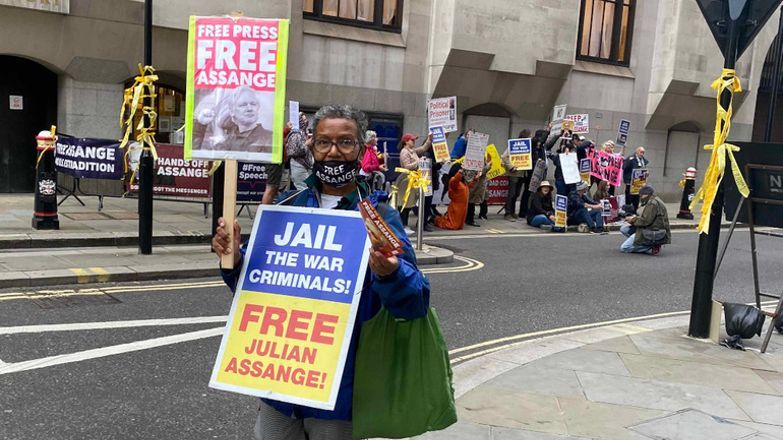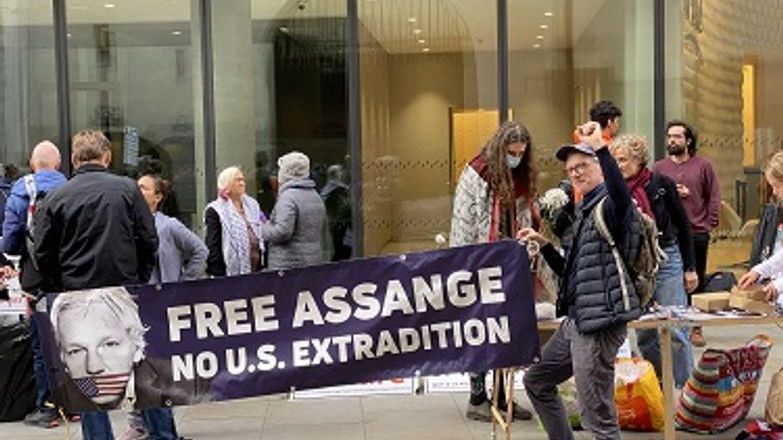Reprieve for Assange, with a sting in the tail
NUJ NEC member Tim Dawson explains the atmosphere in court as Judge Baraitser rules on Julian Assange extradition.
by Tim Dawson, NEC member

Tim Dawson has attended and monitored the proceedings on behalf of the NUJ and IFJ.
© Private
As Judge Vanessa Baraitser started to deliver her ruling in the Old Bailey's number two court yesterday, nothing felt right.
Proceedings started late. Julian Assange slumped in the dock, surrounded by bullet-proof glass, his clothes flapping slightly around his diminished frame. The 'Don't Extradite Assange' campaign had decided against a rally outside the court building because of the risk of spreading covid. The very air tasted sour.
As Baraitser intoned her summary judgement, the atmosphere deteriorated. She dismissed the defence case unequivocally, point by point. The protection of those accused of political offences implied by the US/UK Extradition Treaty was worthless in this case. Assange is accused of actions that would be offences in the UK, she told the court. His actions could not be compared to those of an investigative journalist and by dumping data he had adversely affected scores of US contacts.
She declined to consider the uncontested evidence that CIA contacts bugged the Ecuadorian Embassy to snoop on Assange's meetings with lawyers. And she found ample evidence that a fair trial would be available, once the Wikileaks founder arrived in Virginia.
By now, Assange appeared to be deflating in the dock before our eyes. One sensed a great weight pressing on the usually ebullient shoulders of Edward Fitzgerald QC, who leads Assange's legal team.
Baraitser's cautious delivery continued as she reached her conclusion, providing no prompt of a change in her direction of travel.
In September, the extradition hearing spent a week considering medical evidence relating to Assange. Much of it was harrowing and, unlike all the other expert statements, written copies were not released to the media – despite formal protests.
Baraitser, however, accepted most of the doctors' and psychiatrists' conclusions. Assange has a personal and family history of suicide attempts, he suffers deep, long-term depression. He also has Autism spectrum disorders. These have been managed with some success in HMP Belmarsh, the judge told the court.
Then she turned to conditions in the US 'supermax' prison, ADX Colorado, where it is generally accepted Assange would have been sent, if he had been sentenced by a US court.
"Faced with the conditions of near total isolation… I am satisfied the procedures described by the US will not prevent Mr Assange from finding a way to commit suicide and for this reason I have decided extradition would be oppressive by reason of mental harm and I order his discharge."
The air in court felt suddenly lighter. A broad smile flashed across Assange's face, and the handful of Wikileaks staff in court were animated anew.
Clair Dobbin, the barrister representing the US government, was quick to her feet, insisting that an appeal against the ruling would be immediately forthcoming. Her interjections are always highly controlled, but anger apparently underscored her words. Edward Fitzgerald, meanwhile, had rediscovered his Tiggerish bounce. He requested his client's immediate release.
That may happen on Wednesday. The court hearing will reconvene at Westminster Magistrates (its real home). Fitzgerald promises to make a case featuring both the deteriorating conditions at Belmarsh and a considerable package of measures to reassure the court that Assange would not abscond.
This is a stunning victory for free speech, common sense and humanity. Assange heard the news from the same dock where the 'Guilford Four' were wrongly convicted of murder and sentenced to life imprisonment in 1975. It would be refreshing to think that yesterday's judgement showcases a new era when British justice can be rightly praised for its compassion, fairness and honesty.
A little restraint with the champagne is required, however, as the response from the National Union of Journalists makes clear. "The judge rejected the defence case that the charges against Assange related to actions identical to those undertaken daily by most investigative journalists", commented general secretary, Michelle Stanistreet. "In doing so, she leaves open the door for a future US administration to confect a similar indictment against a journalist."
It is a prudent caution. Of course, it is hard to imagine a similar circumstances prevailing – the most extensive and damaging national security leaks in history, an ex-CIA director running US foreign policy, and a president whose grasp on reality is tenuous at best.
As became clear during the extradition hearing, however, this conjunction appeared against a backdrop that is increasingly challenging for those who report defence and security issues. Several witnesses described US administrations 'going into overdrive' to classify more and more information. Rising levels of hostility to the media have been fuelled by administrations of both stripes increasing enthusiasm for chasing down and denigrating leakers who were clearly honestly intentioned. It makes it hard to believe that Assange will be the last person the US tries to prosecute for acts of journalism.
Assange departed the dock yesterday, wreathed in smiles, having caught a quick chat through the security glass with his partner Stella Morris. He faces challenges too – not least adjusting to freedoms that he has not enjoyed for a decade.
His defence made much of his appreciation of transparency, methodical checking, and concern for the welfare of others. If he chooses to return to public life at some point, my hope would be that he makes these his guiding principles.
Tim Dawson's previous reports:

Unfettered reporting threatened – what Assange extradition hearings reveal
Assange faces a potential sentence with a release date more than a century beyond his lifespan, the indictment contains a description of core journali...

Assange’s bid for privacy is a dangerous precedent
Unless the media forces courts to justify keeping material from the media, the danger is that it becomes the default.
Assange trial hears evidence from Kahled El-Masri
Cover up of his torture by Macedonian police and the CIA was revealed by Wikileaks.
Wikileaks as important as the Pentagon Papers
Daniel Ellsberg gives evidence at Assange extradition hearing.
